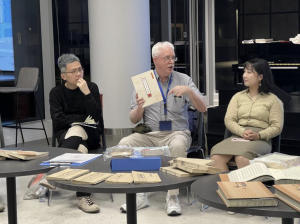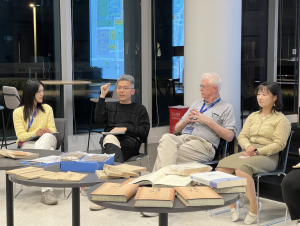
Reported by Yuting Zeng, Class of 2026.
 On the evening of March 24, 2025, a roundtable discussion was held under the theme of “Women’s Literature and Representation,” co-hosted by Yuqing Wang and Yuting Zeng. The event featured three invited speakers: Professor Wenting Ji, Professor Zairong Xiang, and Professor Don Snow, each contributing insights from their research on tanci fiction, mythological retellings, and regional songbooks respectively. The discussion drew over twenty attendees, including students and faculty, and created a space for critical thinking across disciplines.
On the evening of March 24, 2025, a roundtable discussion was held under the theme of “Women’s Literature and Representation,” co-hosted by Yuqing Wang and Yuting Zeng. The event featured three invited speakers: Professor Wenting Ji, Professor Zairong Xiang, and Professor Don Snow, each contributing insights from their research on tanci fiction, mythological retellings, and regional songbooks respectively. The discussion drew over twenty attendees, including students and faculty, and created a space for critical thinking across disciplines.
The event opened with brief introductions to the panelists and the texts under discussion: Destiny of Rebirth 再生缘, The Legend of the White Snake 白蛇传, and Chaozhou Gece 潮州歌册. These works, though differing in form and origin, all center on women’s voices—whether through authorial agency, regional oral storytelling, or symbolic mythology.
Structured in three parts—contextual framing, gender and power, and narrative technique—the discussion touched on diverse issues: the preservation of women’s stories in oral traditions, cross-dressing and gender performance in female-authored fiction, and the metaphorical richness of The Legend of the White Snake across its multiple versions.
Professor Snow generously shared precious archival materials from Chaozhou Gece, offering participants a rare glimpse into the manuscript culture and oral storytelling traditions of southern China. He explained how these narrative songs—often composed and circulated by women—were preserved through oral performance and later published by local shufang (书坊, bookshops or print houses), providing an alternative, regional archive for women’s voices.
Professor Ji explored how cross-dressing in Destiny of Rebirth operates not just as a plot device, but as a lens for negotiating gender identity and social constraints. Her analysis emphasized the significance of female authorship in shaping narrative techniques that depart from male-dominated conventions in scholar-beauty romances.
 Professor Xiang offered a concise introduction to queer theory, helping participants understand how queerness operates not only through characters or identities but also as a lens to read narrative structure, desire, and transformation. He then guided the audience through a range of versions of The Legend of the White Snake, from folk narratives and vernacular novels to stage plays and modern adaptations. By mapping the shifts across these forms, Professor Xiang demonstrated how the White Snake story has continually transformed to reflect evolving cultural and gender expectations.
Professor Xiang offered a concise introduction to queer theory, helping participants understand how queerness operates not only through characters or identities but also as a lens to read narrative structure, desire, and transformation. He then guided the audience through a range of versions of The Legend of the White Snake, from folk narratives and vernacular novels to stage plays and modern adaptations. By mapping the shifts across these forms, Professor Xiang demonstrated how the White Snake story has continually transformed to reflect evolving cultural and gender expectations.
The Q&A session invited further reflection on the texts’ relevance today, drawing links between premodern literary forms and ongoing questions of gender identity, representation, and cultural memory. This roundtable was not just a conversation about literature—it was an invitation to rethink narrative power, gendered histories, and the act of reading itself. Through intersecting perspectives, the event underscored how texts from the past continue to shape and challenge our understanding of women’s roles, both real and imagined.
